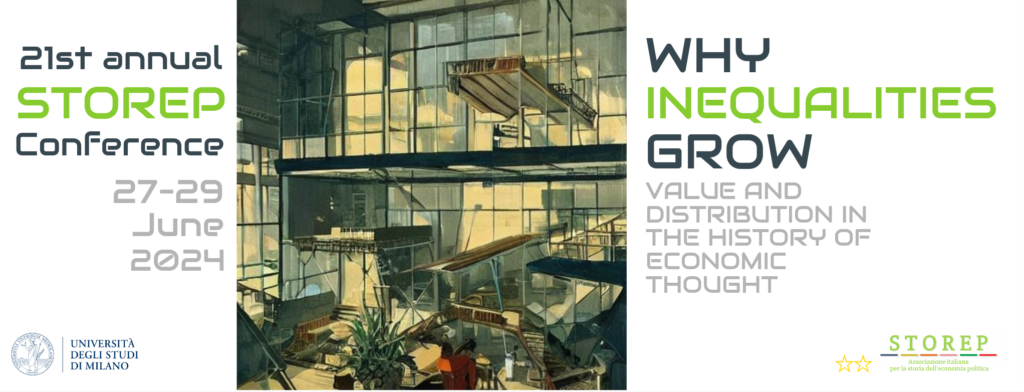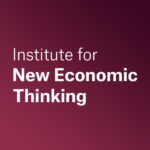 Why Inequalities Grow:
Why Inequalities Grow:
Value and Distribution in the History of Economic Thought
21st STOREP Annual Conference, June 27-29, 2024
Università degli Studi di Milano
Dipartimento di Studi Storici
Casa Cardinale Ildefonso Schuster, Via Sant’Antonio, 5, 20122 Milano
BACKGROUND AND RATIONALE
The 21st STOREP Conference, “Why Inequalities Grow: Value and Distribution in the History of Economic Thought”, will be held at the University of Milan, Department of Historical Studies, June 27-29, 2024. The Conference will be preceded by the Young Scholars Initiative (YSI) pre-conference events (June 26-27, 2024).
The last few decades have witnessed an increase in inequalities on most accounts. Inequality within countries worldwide, with very few exceptions, remains persistently high. And in advanced economies, where it is typically lower, it is on the rise almost everywhere. Some recent studies have managed perhaps to soften the picture, but certainly not to overturn it.
![]() Inequality has many aspects and dimensions: income, wealth, opportunities, and access to basic goods or services, such as housing, water, healthcare, education, and technology. Inequality has many cleavages: it may be defined with respect to countries, regions, or individuals (vertical inequality) but also to ethnicity, religion, caste, gender, and sexuality (horizontal inequality). A peculiar form of inequality has gained prominence in recent years: the inequality between generations, particularly the impoverishment of future generations due to the depletion of natural resources and the increasing costs and risks associated with climate change.
Inequality has many aspects and dimensions: income, wealth, opportunities, and access to basic goods or services, such as housing, water, healthcare, education, and technology. Inequality has many cleavages: it may be defined with respect to countries, regions, or individuals (vertical inequality) but also to ethnicity, religion, caste, gender, and sexuality (horizontal inequality). A peculiar form of inequality has gained prominence in recent years: the inequality between generations, particularly the impoverishment of future generations due to the depletion of natural resources and the increasing costs and risks associated with climate change.
As inequality has increased, so has the acceptance of inequality. Indeed, inequality has found a theoretical justification in neoclassical economics and practical support in neoliberal policies. The former justified inequality by showing, under its own assumptions, that each factor of production was remunerated in proportion to its marginal productivity and, thus, based on technical considerations. The latter supported inequality by reducing regulation, welfare, and income redistribution in the belief that this would stimulate competition, innovation, and efficiency. A particularly striking evidence of how pervasively and persuasively inequality has been made to appear acceptable is provided by the failure of the Swiss “99% initiative”: a referendum proposing to increase taxes on the wealthiest 1% of the population was rejected by over 65% of the voters.
In contrast, distribution and its inherent conflicts were once the primary concern of political economy, as stated by David Ricardo at the beginning of his Principles: “To determine the laws which regulate this distribution, is the principal problem in Political Economy”.
The revival of inequality studies has come with a shift from functional to interpersonal distribution of income and wealth. To be sure, the distinction between classes (of workers, capitalists, and landowners) that characterized the analysis of classical economists may be less clear-cut today. Yet it remains relevant to distinguish different types of income because they have different sources, obey different laws, and largely still accrue predominantly to different social groups. Part of the income still comes from labor, part from enterprise, part from sheer power deriving from the ownership of scarce resources or previously accumulated wealth, part is justified by the assumption of risk, and part from financial speculation, the control of significant market share or barriers to entry and political or social influence.
The distinction between different types of revenues is still relevant to understanding where inequalities come from and how they are to be addressed. The history of economic thought can offer an important contribution to grasping why inequalities grow and how they can be mitigated.
The 21st STOREP Annual Conference aims to foster a debate on inequalities, where they come from, where they are going, and how they can be reduced. To devise new and effective policy approaches, the role of the State and policy-making institutions needs to be rethought within a pluralist, historical, and multidisciplinary perspective.
The Conference welcomes historical, theoretical, and empirical sessions and research papers addressing the different ways in which causes, consequences, and possible remedies have been framed in the history of economic thought. Particularly, it is eager to include studies that can help to understand the impact of COVID-19 and the recent wars, with a special focus on youths, women, and ethnic minorities. To this aim, the conference’s goal is to bring together scholars and leading experts belonging to different fields of the social sciences domain -such as economics and history of economic thought, economic history, sociology, law, demography, and geography- and from all over the world. Scholars from the Global South are especially encouraged to submit proposals and participate in the Conference.
Possible focuses of interest include, but are not limited to:
- Macroeconomic policies and inequality
- Environmental equality and sustainability
- Labor market, labor mobility, minimum wages, trade unions, industrial relations, and collective bargaining
- Universal basic income
- Welfare, health, and education
- Feminist economics, gender inequalities, and minority discrimination
- Industrial policies, public procurement, and innovation
- Technological change, digital capitalism, platform economy, artificial intelligence
- Monopoly capitalism, rentier capitalism
- Information, property rights, and transaction costs
- Development, migration, and territorial disparities
Paper proposals are welcome in all fields adopting historical and/or theoretical approaches from multiple perspectives (Marxian, Post Keynesian, Neo-Ricardian, Neo Schumpeterian, Institutional, Austrian economics, Stock-flow consistent and agent-based modeling, input-output analysis). Empirical approaches (both quantitative and qualitative) are considered, provided that they are appropriately framed in a historical or theoretical perspective.
[General and Detailed Program]
SPECIAL SESSIONS
We are pleased to announce that
 Flavio Comim (Dean of the IQS School of Management, University Ramon Llull in Barcelona, and an affiliated lecturer at Land Economy at the University of Cambridge, UK) will give the keynote lecture at the Conference.
Flavio Comim (Dean of the IQS School of Management, University Ramon Llull in Barcelona, and an affiliated lecturer at Land Economy at the University of Cambridge, UK) will give the keynote lecture at the Conference.
 Bruna Ingrao (Sapienza Università di Roma) will give the eighth “Raffaelli Lecture” (“Market economies and authoritarian rule. Rethinking capitalism, socialism and democracy in the XXIst century”).
Bruna Ingrao (Sapienza Università di Roma) will give the eighth “Raffaelli Lecture” (“Market economies and authoritarian rule. Rethinking capitalism, socialism and democracy in the XXIst century”).
[info on Raffaelli Lecture here]
 STOREP welcomes special sessions jointly organized with other scientific associations, NGOs, and policy-making institutions by inviting them to submit proposals. Special sessions will be jointly organized with the Italian Post-Keynesian Network, Post-Keynesian Economics Society, MinervaLab-Sapienza University of Rome; Economia Civile, INAPP – Istituto Nazionale per l’Analisi delle Politiche Pubbliche, ARiSE- Associazione italiana per la ricerca in storia economica.
STOREP welcomes special sessions jointly organized with other scientific associations, NGOs, and policy-making institutions by inviting them to submit proposals. Special sessions will be jointly organized with the Italian Post-Keynesian Network, Post-Keynesian Economics Society, MinervaLab-Sapienza University of Rome; Economia Civile, INAPP – Istituto Nazionale per l’Analisi delle Politiche Pubbliche, ARiSE- Associazione italiana per la ricerca in storia economica.
As in the past, the 21st STOREP Conference will jointly organize initiatives and special sessions with the Institute for New Economic Thinking, the “Young Scholars Initiative”, and with students and researchers of the international network Rethinking Economics.
Elsa Fornero (Università di Torino, Honorary Professor) and Annalisa Rosselli (Università di Roma Tor Vergata) will lead the INET-STOREP joint initiative on gender inequality.
[info on Invited speakers here]
PROPOSAL SUBMISSIONS, REGISTRATION, CONFERENCE PAPERS
Abstract and session proposals must be uploaded on the submission website of the conference – i.e. via the web-based software “Conference maker”. Please create an account by providing basic contact info and choosing a user ID/password to submit. If you signed up for a previous conference using Conference Maker, you can login with your existing user ID and password. Please follow the instructions here. Note that submitters have to add co-authors if any, once the proposal is submitted (by clicking on “Add/modify authors”).
- Abstract proposals (with keywords, JEL codes, and affiliation) must not exceed 400 words
- Session proposals should include the abstract of the four scheduled papers
Registration: All participants must become STOREP members or renew their membership.
[Conference Registration here]
 The Review of Political Economy (ROPE) will consider selected papers presented at the STOREP Conference for publication. Participants have to submit their papers to ROPE within six months after the Conference. Manuscripts submitted through this procedure will go through peer review as usual. STOREP is also pleased to announce that a series of academic journals have expressed interest in considering Conference papers for publication.
The Review of Political Economy (ROPE) will consider selected papers presented at the STOREP Conference for publication. Participants have to submit their papers to ROPE within six months after the Conference. Manuscripts submitted through this procedure will go through peer review as usual. STOREP is also pleased to announce that a series of academic journals have expressed interest in considering Conference papers for publication.
[info on Conference Papers here]
HOST/GUEST DISCIPLINE: HISTORY
 In 2023, STOREP invited scholars from a “guest discipline”, a neighboring field of study, to discuss its relationships with economics in historical perspective, including the impact it currently has on economics itself, as well as the contribution it can make to creating a new transdisciplinary behavioral science in the future.
In 2023, STOREP invited scholars from a “guest discipline”, a neighboring field of study, to discuss its relationships with economics in historical perspective, including the impact it currently has on economics itself, as well as the contribution it can make to creating a new transdisciplinary behavioral science in the future.
In 2024, the STOREP conference is hosted by a Department of Historical Studies. This offers the opportunity to change perspective and think of the history of political economy as part of a larger family encompassing all the various fields of historical research. Therefore, this year we shall not have a “guest”, but rather a “host discipline”, history.
STOREP 2024 welcomes abstract and session proposals from all areas of history, and particularly economic history, intellectual history and the history of political thought.
IMPORTANT DATES
- March 17, 2024: Deadline for abstracts and sessions submission
- April 14, 2024: Notification of accepted and rejected abstracts and sessions
- May 31, 2024: Deadline for submitting full papers and for becoming Members
- May 12, 2024: Deadline for early registration fee
- June 26, 2024: YSI pre-conference
- June 27-29, 2024: 21st STOREP Annual Conference
Important dates for young scholars: Scholarships and Awards (additional details below)
- March 31, 2024: Deadline for submission of Curriculum Vitae and an extended abstract
- April 28, 2024: Deadline for submitting the final papers for Scholarships
- May 10, 2024: Results of the evaluation process
- December 31, 2024: Deadline for submitting articles for Young STOREP Awards
REGISTRATION FEES
STOREP Members
- (early registration) by May 12: 130€
- (late registration) after May 12: 200€
Others
- (early registration) by May 12: 190€ (annual membership included)
- (late registration) after May 12: 270€ (annual membership included)
Young scholars (non-tenured, under 40)
- STOREP members: 50€
- others: 70€ (annual membership included)
YOUNG SCHOLARS AWARDS
(1) STOREP provides two Awards of 1000€ each (so as to make it possible to reward both history-of-economic-thought articles and more policy-oriented papers) for the best articles presented at the Annual Conference by young scholars under 40 years of age. All applications, with CV and the final version of the papers, should be sent to segretario@storep.org no later than December, 31, 2024. Only papers co-authored by no more than 2 researchers, who both meet the requirements for belonging to the “Young” scholars, are eligible for the Award. Winning recipients of the award in one of the three preceding rounds cannot apply. Papers must neither have been published before nor be under review for publication in a scholarly journal at the time of the conference.
(2) Scholarships for young scholars (under 40 years of age, non-tenured). In order to be eligible, the applicant is required to submit a Curriculum Vitae and an extended abstract (2,000 words ca., both to be uploaded on the Submission website) on any topic relevant to the history of political economy, by March 31, 2024. The final version of the papers must be uploaded within April 28, 2024. Applicants will be informed about the result of the evaluation process no later than May 10, 2024. Winners will be awarded free STOREP Conference registration, including the association’s annual membership fee, as well as, if possible, a lump sum contribution to travel and staying expenses.
COMMITTEE AND PARTNERS
Organizing Committee
Luca Fantacci (Università degli Studi di Milano; local organizer)
Massimo Amato (Università Bocconi)
Angela Ambrosino (STOREP Secretary, Università di Torino)
Gianmaria Brunazzi (Università degli Studi di Milano)
Mario Cedrini (Università di Torino)
Nadia Garbellini (Università di Modena e Reggio Emilia)
Jacopo Magurno (Università Bocconi)
Germano Maifreda (Università degli Studi di Milano)
Eleonora Sanfilippo (Università di Cassino)
Scientific Committee
Angela Ambrosino (STOREP Secretary, Università di Torino)
Enrico Bellino (STOREP President, Università Cattolica del Sacro Cuore)
Mario Cedrini (Università di Torino)
Luca Fantacci (Università degli Studi di Milano; local organizer)
Institutional Partners and Sponsors
Università degli Studi di Milano – Dipartimento di Studi Storici
Young Scholars Initiative
Repower







